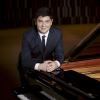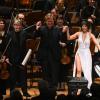
Music Director Laureate Michael Tilson Thomas led the San Francisco Symphony last week in the first of four programs that he’ll conduct during the 2022–2023 season. It was a typical MTT program: two Russian works and Danny Elfman’s new Cello Concerto, an SF Symphony commission in its U.S. premiere.
You might have expected the concerto to be the highlight of the concert, but that came after intermission, in a glorious performance of Tchaikovsky’s Serenade for Strings. MTT led a big-boned, richly hued performance of this 1880 work. He has long been a noted conductor of Russian music, and this was a great example of his affinity for that repertory. These days MTT is using smaller and fewer gestures than a few years ago, but he elicited a performance that was grand in its conception and execution. Rhythms were firm yet flexible, the second-movement Waltz so graceful that you could almost see dancers before your eyes.
We don’t often get to hear the strings without the orchestra’s full complement of winds and brass, but performances like this make you want to hear more works for strings alone. For the entire program, they were arrayed with first and second violins on either side of the podium, with the basses next to the first violins and the cellos and violas between the violins. They were magnificent, producing a big, dark, deep sound and playing their hearts out for MTT.

Elfman has been writing great film music for roughly 40 years, for movies by Tim Burton, Peter Jackson, Barry Sonnenfeld, Sam Raimi, Ang Lee, Gus Van Sant, and more. Over the last 15 or so years, he’s been dipping into concert music as well, writing for both orchestral and chamber forces.
Film music’s purpose is to set and reflect the mood of individual scenes, foreshadow events, and provide other emotional information for the audience. The film itself sets much of the structure of its score. Concert music usually doesn’t work that way, though, except when composers map their pieces to preexisting literary works or scenarios. Elfman’s Cello Concerto, in four movements, eschews structures such as theme and variations, sonata form, and the rondo in favor of a more impressionistic, episodic shape.
The outer movements meander from idea to idea, each presented briefly but not much developed. Elfman’s skill at orchestral color stands him in good stead, and many of the ideas are clever and attractive. The sliding, slithering strings at the start of the first movement, “Searching,” suggest an orchestra tuning up, with the cello’s eventual entry — with a passionate, yearning melody — presenting a counterpoint. The composer gives the soloist plenty to do in this concerto, though he could contrast the instrument with the orchestra more. Cellist Gautier Capuçon executed every bit of it beautifully, with rich tone and technical security.

“Molto (almost) perpetuo,” the concerto’s scherzo, opens with rapid figuration in the upper strings over blocky chords below. It has many changes of time signature and rhythm, eventually resolving to a more lyrical section before closing with more scurrying.
The lyrical “Meditation” that follows is the strongest of the four movements. A wistful introduction leads to a beautiful and mysterious duet for cello and violin, with the solo violin played here with characteristic nobility and restraint by concertmaster Alexander Barantschik. This movement gives the cellist a long cadenza-like passage and leads directly into the vigorous and flashy last movement. “Homecoming” has some of the most memorable music in the score, with a zippy xylophone solo and a long passage contrasting plucked strings with the celesta. Perhaps there’s a bit of homage to John Williams there, because my companion and I both thought we’d been briefly dropped into a Harry Potter film.
The concert opened with a surprisingly tentative performance of Igor Stravinsky’s brief, puckish Symphonies of Wind Instruments. Very likely it received less rehearsal time than the bigger works on the program.




